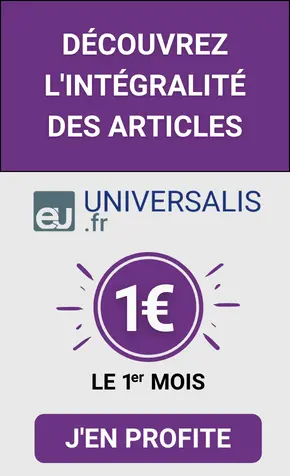MONNAIE Théorie économique de la monnaie
Article modifié le
Bibliographie
M. Allais, Économie et intérêt, Imprimerie Nationale, Paris, 1947
W. Baumol, « The Transactions demand for cash », in Quarterly Journal of Economics, vol. 67, 4, pp. 545-556, 1952
K. Brunner & A. H. Meltzer, « The Uses of money : money in the theory of an exchange economy », in American Economic Review, pp. 784-804, déc. 1971
R. Cantillon, Essai sur la nature du commerce en général, Paris, 1755
R. J. Clower, « A reconsideration of the microfoundations of money », in Western Economic Journal, no 6, 4, pp. 1-9, 1967
M. Friedman, The Optimum Quantity of Money and Other Essays, University of Chicago Press, 1969
M. Friedman & A. Schwartz, A Monetary History of the United States, 1867-1960, Princeton University Press, 1963
J. Gurley & E. Shaw, Money in a Theory of Finance, The Brookings Institution, 1960
F. Hahn, « On Some Problems of proving the existence of an equilibrium in a monetary economy », in Hahn et Brechling, The Theory of Interest Rates, Macmillan, pp. 126-135, 1965 ; Monnaie et inflation, Economica, Paris, 1984
J. R. Hicks, « A suggestion for simplifying the theory of money », in Economica, vol. II, no 5, pp. 1-19, 1935 ; « Liquidity », in The Economic Journal, no 288, vol. LXXII, 1962
K. Iwai, « The Evolution of money : a search theoretic foundation of monetary economics », in CARESS Working Paper, 8816, University of Pennsylvania, 1988
J. M. Keynes, Treatise on Money, Macmillan, 1930 ; The General Theory of Employment, Interest and Money, ibid., 1936
N. Kiyotaki & R. Wright, « A contribution to the pure theory of money », in Journal of Economic Theory, vol. 53(2), pp. 215-235, 1991
R. E. Lucas, « Equilibrium in a pure currency economy », in Economic Inquiry, vol. 18, pp. 203-220, 1980 ; « Nobel Lecture : Monetary Neutrality », in Journal of Political Economy, vol. 104, 4, pp. 661-682, 1996
K. Marx, Le Capital, 1875 ; rééd. Éditions sociales, Paris, 1977
M. Mauss, Sociologie et anthropologie, P.U.F., Paris, 1924
D. Patinkin, Money, Interest and Prices, Harper & Row, 1956 (2e éd. 1965 ; trad. franç., P.U.F., Paris, 1972)
C. D. Romer & D. H. Romer, « Does monetary policy matter ? A new test in the spirit of Friedman & Schwartz », in J. O. Blanchard et S. Fischer dir., NBER Macroeconomics Annual, vol. 4, M.I.T Press, Cambridge, 1989
J. Rueff, L'Ordre social, Payot, Paris, 1945
P. A. Samuelson, « An exact consumption-loan model of interest with or without the social contrivance of money », in Journal of Political Economy, vol. 66, 6, pp. 467-482, 1958
T. Sargent & N. Wallace, « Rational expectations, the optimal monetary instrument and the optimal money supply rule », in Journal of Political Economy, vol. 83, 2, pp. 241-254, 1975
G. Selgin, The Theory of Free Banking, Rowman & Littlefield, 1988
F. Simiand, « La Monnaie réalité sociale », in Les Annales sociologiques, série D, fasc. 1, pp. 1-86, 1934
J. E. Stiglitz & A. Weiss, « Credit Rationing in markets with imperfect information », in American Economic Review, vol. 71(3), pp. 393-410, 1981
J. Tobin, « Liquidity Preference as behavior toward risk », in Review of Economic Studies, vol. 25(67), 1958 ; « A general equilibrium approach to monetary theory », in Journal of Money, Credit and Banking, pp. 15-29, fév. 1969 ; « Money and income : post hoc ergo propter hoc ? », in Quarterly Journal of Economics, vol. 84, pp. 301-317, 1970
S. C. Tsiang, « Walras Law, Say's Law and liquidity preference in general equilibrium analysis », in International Economic Review, vol. 7, 3, pp. 329-345, sept. 1966
N. Wallace, « The Overlapping Generations Model of fiat money », in Kareken et Wallace, Models of Monetary Economies, FRB of Minneapolis, pp. 49-96, 1980
L. Walras, Éléments d'économie politique pure, Economica, Paris, 1900
E. L. Whalen, « A rationalization of the precautionary demand for cash », in Quarterly Journal of Economics, vol. 80, pp. 314-324, 1966
K. Wicksell, Interest and Prices, 1898 (trad. Macmillan, Londres, 1936)
M. Woodford, « Price Level Determinacy without the Control of a Monetary Aggregate », in Carnegie-Rochester Conference Series on Public Policy, vol. 43, pp. 1-46, 1995.
Accédez à l'intégralité de nos articles
- Des contenus variés, complets et fiables
- Accessible sur tous les écrans
- Pas de publicité
Déjà abonné ? Se connecter
Écrit par
- Patrick VILLIEU : professeur de sciences économiques à l'université d'Orléans
Classification
Médias
Autres références
-
LA SIGNIFICATION SOCIALE DE L'ARGENT (V. A. Zelizer)
- Écrit par Frédéric LEBARON
- 999 mots
La traduction de The Social Meaning of Money, publié aux États-Unis en 1994 (coll. Liber, Seuil, 2005), permet au public francophone d'accéder directement à ce qui est devenu un « classique » de la nouvelle sociologie économique américaine, consacré à la question, centrale en cette période de « marchandisation...
-
BÂLE ACCORDS DE (1972)
- Écrit par Marie-France BAUD-BABIC
- 303 mots
Le 24 avril 1972, les accords monétaires de Bâle sont signés. Ils mettent en place l'une des propositions du plan rédigé par l'équipe réunie autour de Pierre Werner, Premier ministre luxembourgeois de l'époque, proposant de parvenir par étapes à la création d'une Union économique et monétaire....
-
AFTALION ALBERT (1874-1956)
- Écrit par Guy CAIRE
- 194 mots
Né en Bulgarie, mort à Genève, Aftalion a enseigné successivement aux universités de Lille et de Paris. On lui doit une œuvre abondante et plusieurs contributions importantes à la théorie économique moderne. Dans son ouvrage Les Crises périodiques de surproduction (1913), il montre comment...
-
AGLIETTA MICHEL (1938- )
- Écrit par Yamina TADJEDDINE
- 1 088 mots
- 1 média
Penseur du capitalisme et de la monnaie, le Français Michel Aglietta est un chercheur, un pédagogue et un expert reconnu des économistes, des historiens et des anthropologues, mais aussi des politiciens et des syndicalistes de toute tendance.
Né dans une famille modeste d’immigrés italiens en...
-
AGRÉGAT ÉCONOMIQUE
- Écrit par Marc PÉNIN
- 1 488 mots
Une catégorie particulièrement importante, pour l'analyse et la politique économique, des agrégats de stock est constituée par les agrégatsmonétaires (ensemble des moyens de paiement et des actifs financiers facilement convertibles en moyens de paiement, possédés par les agents économiques non... - Afficher les 147 références
Voir aussi
- NÉO-CLASSIQUE THÉORIE ÉCONOMIQUE
- LETTRE DE CHANGE ou TRAITE
- PAIEMENT MODES DE
- PRIX POLITIQUE DES
- ÉCONOMIE DE LA BANQUE
- RÉSERVES OBLIGATOIRES, économie bancaire
- MARCHÉ INTERBANCAIRE
- INNOVATION FINANCIÈRE
- VALEUR MONÉTAIRE
- FRAPPE DE LA MONNAIE
- ASYMÉTRIE D'INFORMATION
- PAIEMENT ET MONNAIE ÉLECTRONIQUES
- MONNAIE THÉORIE ÉCONOMIQUE DE LA
- PAPIER-MONNAIE
- REFINANCEMENT
- ÉQUILIBRE GÉNÉRAL THÉORIE DE L', économie
- UNITÉ DE COMPTE
- ACTIF MONÉTAIRE
- POLITIQUE MONÉTAIRE
- MARCHÉ MONÉTAIRE
- ÉCHANGE, économie
- CRÉANCES & DETTES
- ARGENT, monnaie
- POLITIQUE BUDGÉTAIRE
- TRANSFORMATION, crédit
- RÉGULATION MONÉTAIRE & FINANCIÈRE
- WOODFORD MICHAEL (1955- )




